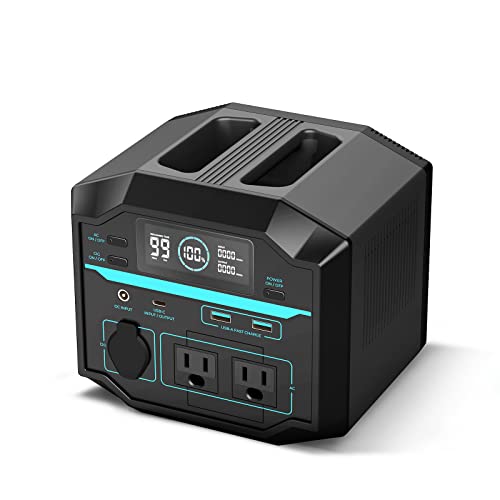In the search for reliable and portable power solutions, the market is buzzing with diverse options. Two noteworthy contenders are the Renogy 200 and the EcoFlow Delta Mini – both aiming to power your off-grid adventures, emergency preparations, and even small-scale professional setups. This detailed comparison will dissect their specifications and features to help semi-technical consumers decide which portable power station suits their needs best.
Design and Portability
When it comes to taking power on the road, size does matter. The Renogy 200 leads the lightweight category, tipping the scales at a mere 5.3 pounds and boasting dimensions that make it a breeze to carry. In contrast, the EcoFlow Delta Mini is more robust, weighing in at 23.6 pounds, yet designed with ease of transport in mind.
Battery Capacity and Output
Battery capacity dictates how long a power station can keep your devices running. The Renogy 200’s 222Wh is humble but sufficient for charging small electronics. On the other hand, the EcoFlow Delta Mini is a powerhouse with 882Wh, ready to tackle more demanding appliances and longer usage times.
Charging Options and Flexibility
Both these portable stations offer diverse charging options, including solar panel inputs, AC adapters, and car chargers. Notably, the EcoFlow Delta Mini elevates convenience with its X-Stream fast charging technology, promising significant battery levels with just a quick wall socket charge.
Output Versatility and Device Compatibility
The Renogy 200 may power up to six devices simultaneously with a combination of USB and DC outlets. Meanwhile, the EcoFlow Delta Mini takes it up a notch, catering to up to 12 devices at once with multiple USB points, a hefty AC output, and a DC port for car-powered tools.
Built-in Protections and Safety
Safety is paramount, and both models are equipped with smart battery management systems offering protection against common electrical hazards. Whether you’re camping in the wild or facing a power outage at home, you can trust these devices to operate securely.
Eco-Friendliness and Solar Integration
In an era where sustainable solutions are crucial, both power stations are compatible with solar panels, allowing for an environmentally conscious power source during your off-grid explorations or as a backup power solution.
Technical Specifications Table
| Specification | Renogy 200 | EcoFlow Delta Mini |
|---|---|---|
| Weight | 5.3 pounds | 23.6 pounds |
| Dimensions | 7.48 x 6.10 x 6.99 inches | 14.9 x 7.2 x 9.4 inches |
| Battery Capacity | 222Wh | 882Wh |
| AC Outlet (Continuous) | 200W | 1400W |
| Surge Capability | 400W | 2100W |
| Charging Method | AC, USB-C, Car, Solar | AC, Car, Solar |
| Fast Recharging | 1.5 hours to 80% | 1.6 hours to 100% |
| Cycle Life | Not Specified | 800 cycles to 80% capacity |
| Max Solar Input | Not Specified | 300W |
| USB Ports | 3 (USB-A and C) | 4 (USB-A and C) |
| DC Outlets | 1 (CIG Port) | 1 (Car Port) |
| Additional Features | LCD Display, BMS Protection | EcoFlow App, BMS Protection |
Additional Considerations
Choosing between Renogy 200 and EcoFlow Delta Mini isn’t just about the specs – it’s also about how those specs translate to real-world usage. Consider how you plan to use the power station: Is it for sporadic use during short trips? Do you need a reliable backup for frequent power tools usage? Or maybe a combination of both? Think about these scenarios as we dive further into the details.


Ultimately, your portable power station should align with your lifestyle and power demands. The Renogy 200 is tailored for minimalists who need to keep devices like smartphones, tablets, and cameras charged. Conversely, the EcoFlow Delta Mini is for the power-hungry users who require a more substantial energy reserve for tools, laptops, and perhaps even small appliances.
Whichever you choose, rest assured that both the Renogy 200 and EcoFlow Delta Mini represent the forefront of portable power innovation. They are reliable companions that ensure you have the might of modern electricity – all within arm’s reach.


Leave a Reply